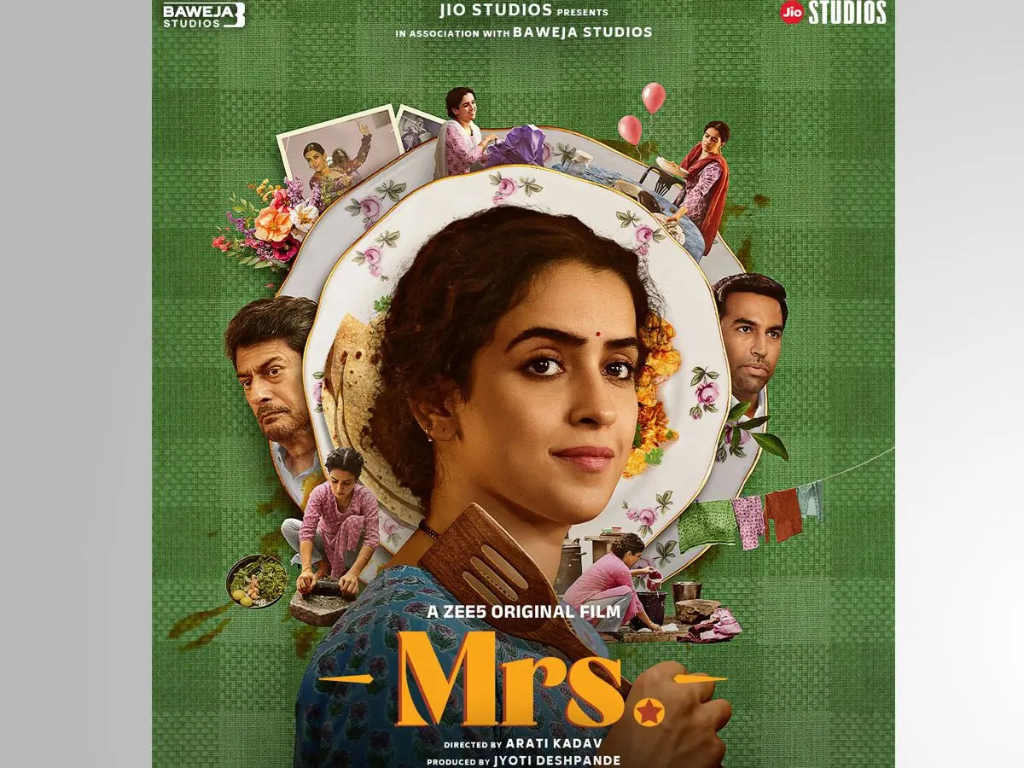When I first watched “Mrs.,” directed by Arati Kadav I found myself confused. It wasn’t the plot or the characters that puzzled me, but the unsettling familiarity of the story itself. The quiet discomfort, the unspoken expectations, the way a woman’s dreams seemed to shrink within the invisible walls of marriage—it all felt too real.
The movie follows Richa who, after marriage, realises that the life she is living isn’t truly hers. It’s a life that was chosen for her, shaped by traditions, family expectations, and societal norms that dictate who she should be before she even has a chance to decide for herself. As she begins to question her role, to push against the boundaries imposed upon her, the world around her starts to tremble. And isn’t that always how change begins? With a single question: Why?
Growing up, many of us were taught that our worth is tied to how well we can manage a home. Our mothers would remind us to learn cooking and cleaning, constantly asking, “What will you do once you get married?” “What will your in-laws say if you don’t know how to do all that?” It was never about “if” we got married but “when”, as if that was the ultimate purpose of our existence. Watching “Mrs.” made me realise how deeply ingrained these expectations are, how we are trained from childhood to prepare for a role we never actively chose.
This is not just fiction. This is reality. And it’s a reality that countless girls and women in India continue to face every day. In many parts of the country, girls are still told that their education is secondary, that their dreams should fit within the limits set by their families, that their future is not for them to decide. But what happens when they dare to step outside these boundaries?
At one point in the film Savi, the young neighbour, mentions that her mother does not have good luck because she doesn’t have a husband. Richa trying to offer her reassurance, tells her that her mother is a prime number—something that no one can divide or break and that she, herself, is good luck. Savi later turns these words back to Richa, reminding her that she, too, is a prime number. This metaphor of prime numbers, indivisible, whole, and resilient—becomes a key symbol in the film. And as Richa’s world crumbles, she begins to question whether she, too, is still a prime number, or if she has been broken down and reshaped by the expectations placed on her.
Isn’t that what society does to women? It teaches us to exist in relation to others—someone’s daughter, someone’s wife, someone’s mother—never just ourselves. We are expected to mould ourselves to fit into roles, to sacrifice pieces of our identity for the comfort of others. But what if we, too, were prime numbers? Whole. Indivisible. Uncompromising in our right to be who we are.
And maybe, just maybe, that’s where the real rebellion begins—when a woman dares to stand in her own identity, unapologetically.
One of the more ironic moments in “Mrs.” is when Richa’s husband says, “Time ke saath badalna zaroori hai,” (It’s important to change with time) while he himself is stuck in the 18th century. He doesn’t let his wife work, doesn’t share any household responsibilities, and insists on keeping everything manual, like washing clothes by hand, refusing to adapt to the conveniences that modern technology offers. Meanwhile, he holds onto archaic views of what a woman’s role should be.
This disconnect becomes even more glaring when it comes to consent and respect in their relationship. Richa’s desires and opinions are disregarded, and her husband makes decisions for her—whether it’s about having children or anything else—without even considering her thoughts or her desires. It’s a chilling reminder of how often women’s voices are ignored, especially when it comes to the most intimate aspects of their lives.
Watching “Mrs.” made me realize how critical it is to teach girls about consent, their rights, and the importance of family planning—topics that are still taboo in many households.
My work has always been behind a desk, and I’ve often questioned why we are working for the same cause that so many others are. But after watching “Mrs.”, I now understand. I see why we do what we do at Milaan. We are teaching our girls to raise their voices, to challenge norms, and to define their futures on their own terms. And I absolutely love how we teach men that no task is only a woman’s responsibility—because we all have a part to play in breaking down these outdated, patriarchal systems.
So, when I look at the work we do, I no longer just see a task or a duty. I see change. I see girls growing into the prime numbers they were always meant to be.
“Mrs.” made me question so much—the way women’s labour is taken for granted, the way love is conditioned upon obedience, the way even small joys like dancing are deemed inappropriate if they do not serve a larger, familial purpose.
But perhaps the most heartbreaking part was the silence. The way Richa never truly had a voice in her own home. Her father-in-law decided whether she could work. Her husband decided when she should have a child. Her mother-in-law, once a PhD scholar, had long accepted that her life’s purpose was to serve her family. And when Richa finally broke free, she was made to feel as if she was the one who had abandoned them. Isn’t that always the case? A woman choosing herself is seen as selfish. But why? Why is our freedom always up for debate?
If “Mrs.” made you uncomfortable, if it made you pause and think about the invisible rules that still govern a woman’s life—then don’t let that discomfort fade. Sit with it. Ask the hard questions. Why are these battles still being fought? Why does freedom still come with conditions for so many women?
Because the story doesn’t end when the credits roll. It spills into our homes, our workplaces, our everyday conversations. It lingers in the way we raise our daughters and the expectations we place on them. It is alive in the voices of girls who refuse to be silenced.
So, what will you do with these questions? Will you ignore them, or will you let them change the way you see the world?
Author: Sheril Susan Manu
Associate – Communication


